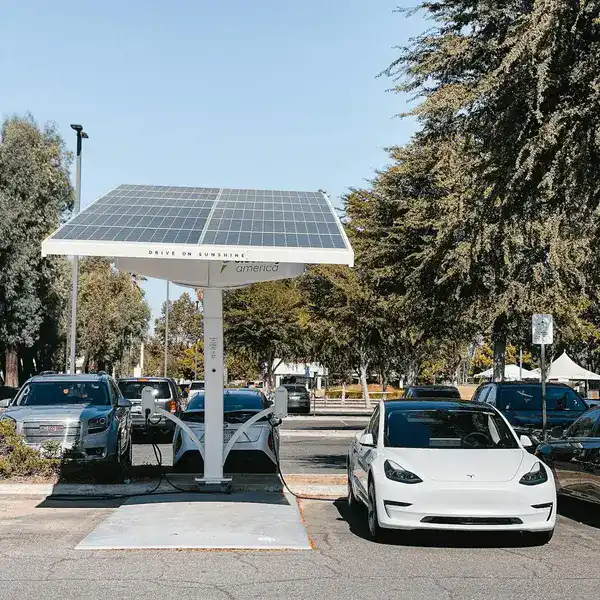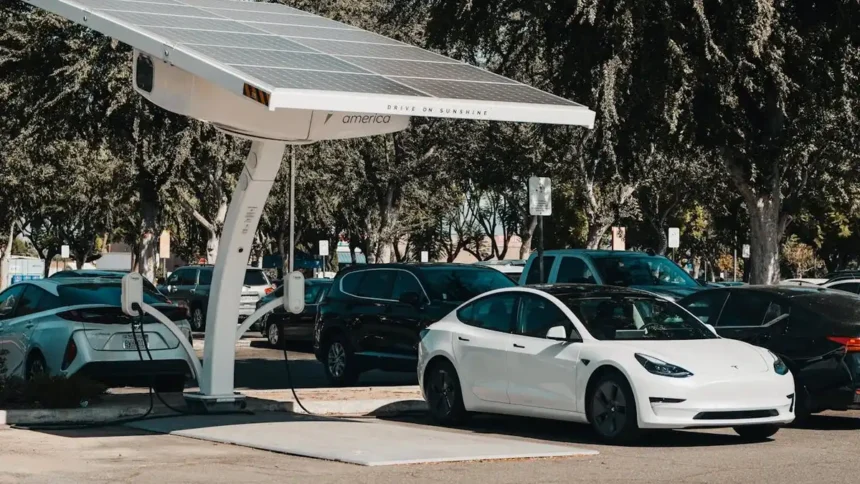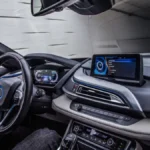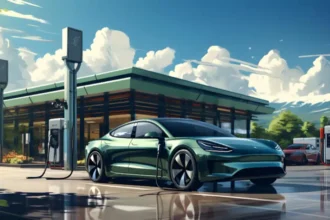In a world increasingly focused on sustainability, solar-powered cars are emerging as a revolutionary solution in the automotive industry. These vehicles harness the sun’s energy, transforming it into a clean, renewable source of power for driving. As concerns about climate change and fossil fuel dependence grow, solar cars offer a promising alternative that can reduce our carbon footprint and reshape the future of transportation. Solar-powered cars, also known as solar vehicles, integrate photovoltaic cells to convert sunlight into electricity, which can be used to power electric motors.
This innovation not only reduces reliance on traditional energy sources but also presents exciting possibilities for enhancing the efficiency and accessibility of personal and public transportation.
The Mechanics Behind Solar-Powered Cars

Understanding how solar cars operate provides insight into their potential and benefits. Solar-powered cars utilize solar panels composed of photovoltaic (PV) cells, which convert sunlight into electricity. Here’s how the process works:
- Solar Energy Absorption: The solar panels on the vehicle’s surface capture sunlight and convert it into direct current (DC) electricity.
- Energy Storage: The generated electricity is either used immediately to power the vehicle or stored in onboard batteries for later use.
- Powering the Motor: The stored electricity powers the electric motor, driving the vehicle. Many solar cars can also draw energy from the grid if necessary.
- Regenerative Braking: Some models incorporate regenerative braking technology, which captures energy during braking and feeds it back into the battery, enhancing efficiency.
Benefits of Solar-Powered Cars
The adoption of solar-powered cars presents several compelling advantages, making them an attractive option for environmentally conscious consumers and innovators alike:
- Environmental Impact
- Reduced Carbon Emissions: By utilizing renewable solar energy, these vehicles significantly lower greenhouse gas emissions compared to traditional combustion engines.
- Sustainable Energy Source: Solar energy is abundant and inexhaustible, providing a sustainable alternative to fossil fuels.
- Cost Savings
- Lower Operating Costs: Once the initial investment is made, solar cars can drastically reduce fuel costs, as sunlight is free.
- Government Incentives: Many governments offer tax credits and incentives for purchasing solar or electric vehicles, enhancing affordability.
- Energy Independence
- Reduced Dependence on Fossil Fuels: Solar-powered cars contribute to energy independence by decreasing reliance on oil and gas.
- Potential for Off-Grid Living: Solar vehicles can empower individuals to live off the grid, using renewable energy for both transportation and home energy needs.
- Technological Innovation
- Advancements in Battery Technology: Ongoing research into energy storage solutions enhances the efficiency and range of solar cars.
- Smart Features: Many solar vehicles come equipped with advanced technology, including smart navigation systems and connectivity features.
Challenges Facing Solar-Powered Cars
Despite their potential, solar-powered cars face several challenges that must be addressed to facilitate widespread adoption:
- Initial Cost
- High Manufacturing Costs: The production of solar panels and electric components can be expensive, resulting in higher upfront costs for consumers.
- Limited Availability: The market for solar cars is still developing, with fewer options available compared to traditional vehicles.
- Efficiency Concerns
- Limited Energy Conversion: Current solar technology has efficiency limits, meaning solar panels can only convert a fraction of sunlight into usable energy.
- Weather Dependency: Solar-powered vehicles rely on sunlight, making their effectiveness dependent on weather conditions and geographic location.
- Infrastructure Needs
- Charging Stations: The growth of solar cars requires an increase in charging infrastructure, including solar charging stations, to support electric vehicle owners.
- Public Awareness: Education and awareness about the benefits of solar-powered vehicles are essential for encouraging adoption.
Current Market Trends for Solar Cars in 2024
The landscape of solar-powered cars is evolving rapidly, with notable advancements and market trends shaping the future:
- Emerging Models
- Several manufacturers are introducing innovative solar vehicles, including the Lightyear One and the Aptera, designed to maximize energy efficiency and range.
- Incorporation of Solar Technology in Traditional Cars
- Many established automakers are exploring ways to integrate solar technology into existing electric vehicle models, enhancing their energy efficiency.
- Collaborations and Partnerships
- Collaborations between automotive companies and solar technology firms are paving the way for advanced solar car models that can optimize performance and affordability.
Table: Comparison of Solar-Powered Cars Available in 2024
| Model | Manufacturer | Estimated Range (miles) | Solar Panel Coverage | Key Features |
|---|---|---|---|---|
| Lightyear One | Lightyear | 388 | 54 sq ft | High efficiency, spacious design |
| Aptera | Aptera | 1,000 | 45 sq ft | Extremely lightweight, all-electric |
| Hyundai Sonata Solar | Hyundai | 600 | Integrated roof panels | Hybrid solar-electric, family car |
| Toyota Prius Prime | Toyota | 640 | Optional solar roof | Plug-in hybrid with solar assist |
| Fisker Ocean | Fisker | 350 | Optional solar roof | Sustainable materials, off-road capability |
Frequently Asked Questions (FAQs)
Q1. Are solar-powered cars practical for everyday use?
A: Yes, solar-powered cars can be practical for daily commuting, especially in sunny regions. With advancements in battery technology, many solar cars now offer significant range and convenience.
Q2. How do solar cars perform in cloudy or rainy weather?
A: While solar cars can still generate energy in cloudy conditions, their efficiency decreases. However, most solar vehicles also have the ability to charge through traditional electric charging stations.
Q3. What is the lifespan of solar panels on cars?
A: Typically, solar panels on vehicles have a lifespan of 25 years or more, depending on the quality of the panels and maintenance.
Q4. Can I install solar panels on any car?
A: While it is technically possible to retrofit a vehicle with solar panels, it is advisable to purchase a car designed for solar energy integration to ensure optimal performance and efficiency.
Q5. Are there government incentives for buying solar-powered cars?
A: Yes, many states and local governments offer incentives for purchasing solar or electric vehicles, which can include tax credits, rebates, and reduced registration fees.
The Future of Solar-Powered Cars
As we look ahead, the future of solar-powered cars is promising and filled with possibilities. The automotive industry is increasingly prioritizing sustainability, with many manufacturers committing to carbon neutrality and the development of electric and solar vehicles. Here are some anticipated trends in the coming years:
- Enhanced Technology
- Improved Solar Panel Efficiency: Ongoing research is focused on increasing the energy conversion efficiency of solar panels, potentially allowing for more power generation.
- Integration with Smart Grids
- Vehicle-to-Grid (V2G) Technology: Future solar cars may be equipped with V2G capabilities, enabling them to feed excess energy back into the grid, providing additional income for owners.
- Widespread Adoption
- Increased Consumer Acceptance: As awareness grows and more affordable models become available, consumer acceptance of solar-powered cars is likely to rise significantly.
- Global Expansion
- International Collaborations: Global partnerships among manufacturers and governments may accelerate the development and distribution of solar-powered vehicles worldwide.
- Innovative Business Models
- Subscription Services: Companies may explore subscription models for solar cars, providing access to vehicles without the burden of ownership, making it easier for consumers to transition to solar technology.
Conclusion
The rise of solar-powered cars marks a significant shift in the automotive landscape, promising a more sustainable and environmentally friendly future. As technology continues to evolve and awareness increases, these vehicles have the potential to transform how we think about transportation.
Solar cars are not just a trend; they represent a critical step toward reducing our reliance on fossil fuels and minimizing our environmental impact. By embracing solar technology, consumers can contribute to a cleaner, greener planet while enjoying the benefits of innovative and efficient transportation. The future of driving is bright—quite literally—thanks to solar-powered cars.








